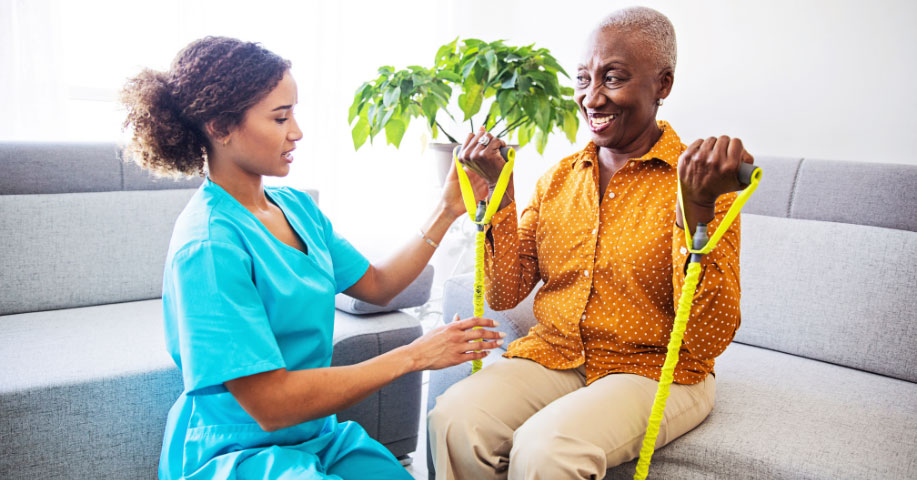As Dorothy once said, there’s no place like home. This is especially true for those who have recently spent time in hospital. When you have a surgery, suffer an injury or fall, or have a stroke or heart attack; one of the biggest goals is going home.
When you do get home, you may find there are some things you could do before which you cannot do now, or some tasks are more difficult because of your injury or surgery. This is where rehab at home could help.
What is rehabilitation?
Put simply, rehabilitation involves movements, activities and exercise which help you regain abilities after a surgery, injury or medical episode like stroke or a heart attack.
Some of your rehabilitation will likely start before you leave hospital, and you will be assessed by medical professionals such as physiotherapist to make sure it is safe for you to go home and continue your recovery there.
Your rehabilitation plan will be tailored specifically for you and your recovery goals. Although every rehabilitation plan is different, each will likely involve exercises and movements for you to do with the help of an allied health professional and on your own.
What does rehab in the home involve?
Rehab in the home is very similar to what you would do in a hospital setting. It is a convenient way to continue your recovery but return to a feeling of normality.
In fact, research from the Ingham Institute in Sydney has found in-home rehab is just as effective as in-hospital care for some conditions [1]. A study of Australians who had knee replacements found those who undertook rehab at home, compared to those who had in-hospital rehabilitation, had similar clinical outcomes at 10, 26 and 52 weeks after surgery [1].
When you have agreed to rehab at home with your care team, you can stay at home and your allied health therapist will come to you.
Some things your therapist can help you with include:
- Personalised care plans
This will include everything to make sure you are safe and have all the support you need at home. It could include having support staff come into the home to help you with certain tasks. When you develop your personal care plan with your allied health therapist, it’s important you complete all your daily tasks, like cooking and showering, to see if there are any times you need additional support. - Exercises at home
Although every case is different, a lot of in-home rehabilitation will involve exercises and movements to regain your strength and balance. Your exercise routine will depend on what surgery or medical condition you are recovering from, but it could include things like back exercises at home, or core exercises at home.
Your exercises at home can be a key part of your rehab and you will likely have the support of a physiotherapist to understand each exercise and how to modify them based on your abilities. - Nutritional support
Nutritional support is an important part of recovery. Eating the right food can mean you have more energy, which is important to be able to complete parts of your rehab at home. Nutritional support from a dietitian might be beneficial if you are not moving as much as normal and might experience unwanted weight loss or gain.
Nutritional support can also be as simple as someone coming into your home to help prepare your meals. Contact Focused Health Care if you would like to discuss this as part of your rehab in the home. - Mobility enhancements
Depending on the surgery or injury you have, you may need to make some adjustments to your home to make it safer for you while you recover. This could include handrails, shower chairs and non-slip mats. An occupational therapist can help with this.
You may also benefit from having a nurse or support worker visit you when you are undertaking personal care such as showering or if you need additional support around the house. Focused Health Care can help with this. Contact us today to discuss your rehab at home plans. - Family involvement
It is important to have people around you can trust while you recover. As part of your rehab at home, your family might be able to provide extra support, with things like cooking and cleaning, as well as helping you get out and about when you’re ready. If you don’t have family support around who can do this, our team at Focused Health Care would be honoured to help. Contact one of our friendly staff today to find out more.
How can Focused Health Care help with in-home rehab?
At Focused Health Care, our multidisciplinary team of health professionals can support you as part of your rehab at home.
Our highly trained staff understand coming into your home is a privilege, particularly as you recover from surgery or an injury, so we do not take our role lightly. We are here to help you at every stage of the recovery, including physical rehabilitation, emotional wellbeing and settling back into your home.
Contact us today to see how we can help you.
Disclaimers:
All information is general and is not intended to be a substitute for professional medical advice. Focused Health Care can consult with you regarding your individual health needs.
References:
1. Knee rehab at home ‘as good as hospital’ – Ingham Institute for Applied Medical Research, 9 March 2024






